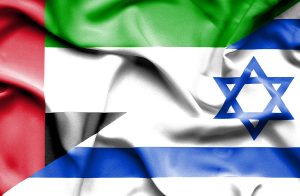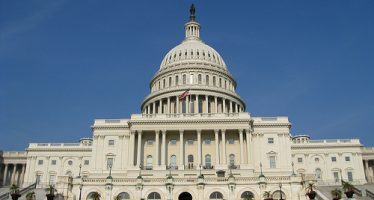Middle East – Business Trumps Politics
 Joint business ventures, and the pragmatism required for success, laid the groundwork for the normalisation of relations between Israel and the United Arab Emirates (UAE) which was marked by the touchdown of the first official El Al flight at Abu Dhabi International Airport on August 13. On board, US and Israeli diplomats and officials celebrated the historic moment whilst Israeli journalists, swiftly dispatched by their editors, surprised morning audiences with an ebullient ‘Good Morning from Dubai’ and panoramic shots of the Burj Khalifa, the world’s tallest building poking 830 meters into the sky.
Joint business ventures, and the pragmatism required for success, laid the groundwork for the normalisation of relations between Israel and the United Arab Emirates (UAE) which was marked by the touchdown of the first official El Al flight at Abu Dhabi International Airport on August 13. On board, US and Israeli diplomats and officials celebrated the historic moment whilst Israeli journalists, swiftly dispatched by their editors, surprised morning audiences with an ebullient ‘Good Morning from Dubai’ and panoramic shots of the Burj Khalifa, the world’s tallest building poking 830 meters into the sky.
In an almost-replay of President Richard Nixon’s 1972 surprise visit to the People’s Republic of China, which stunned Americans and opened the host nation to the wider world it had shunned, the announcement of a ‘normalisation pact’ that formalises the links between Israel and the UAE upsets the regional power balance and signals the beginning of a major geopolitical shift that may see more countries recognise Israel and establish diplomatic relations with Tel Aviv.
Iran is, of course, quite unhappy and repeatedly denounced the UAE’s long-expected move as a ‘betrayal’ of the Palestinian Cause, conveniently forgetting to mention that 70+ years of disengagement has delivered few tangible results for the long-suffering people. Whilst in Tehran Supreme Leader Ayatollah Khamenei went on a verbal rampage, the Emirati government emphasised that its ‘bold but necessary’ step helps ease the polarisation in the region.
However, it was business that drew the two countries closer. According to data from the Tony Blair Institute for Middle East Change, trade between Israel and the Emirates last year amounted to a modest $1 billion or so. This number does not include the business conducted by Israeli surveillance firms in Saudi Arabia, Bahrain, and the UAE – the three countries that adhere to the philosophy that their enemy’s enemy is probably a potential friend. The common denominator being, of course, Iran.
In business terms, the UAE is most interested in gaining access to desert agriculture technology, a field in which Israel leads the world, and biomedical research. Almost immediately after the rapprochement was made public, companies from both countries announced a joint push for the development of a covid-19 vaccine. National Investment, the Emirati company charged with funding public sector initiatives and projects, on August 15 signed a ‘strategic commercial agreement’ with Israel’s TeraGroup to research the novel corona virus and develop new testing devices and methods.
TeraGroup has made significant progress in the design and manufacture of a breathalyser that offers a fast, cheap, and non-invasive way to detect infections. The company’s BioSafety device has already been deployed by the Emirates Field Hospital in Abu Dhabi which now plans to take its testing regime and kit national.
Early July, some six weeks before the entente was formalised, the official Emirates News Agency announced that Abu Dhabi-based high-tech pioneer Group 42 had inked a deal with two Israeli defence contractors – Israel Aerospace Industries and Rafael Advanced Defense Systems – to conduct research related to covid-19.
The UAE has long been quietly tolerant of its small Jewish community. Numbering, perhaps, a few thousand, Jews in the Emirates have received covert government backing and are allowed to discretely maintain two pseudo-secret places of worship. Now, the Emirates are preparing to receive an influx of tens of thousands of Israeli tourists and businesspeople. Tour operators are scrambling to cobble together travel deals and expect that, once the pandemic has abated, as many as 300,000 Israelis may come to visit the UAE annually.
Abu Dhabi hotel managers have received instructions to ready their restaurant kitchens for kosher certification by the country’s only rabbi, Levi Duchman. The 27-year-old is excited that the doors have, at long last, opened for business, leisure, and rites.
The UAE has largely ignored the barrage of criticism hurled at the country from Iran, Turkey, and the Palestinian Territories. Local support for the deal is strong, especially amongst young people who long to break with the olden ways and are tired of the rhetoric and animosity.
After the Kingdom of Bahrain joined the détente, most critics threw conceded defeat in the face of a diplomatic fait accompli. The country’s move, though not necessarily a complete surprise, may convince other moderates such as Oman, Morocco, and Sudan to offer formal recognition to the State of Israel as well. Further afield, Indonesia and Malaysia are also expected to follow the UAE’s lead before long.
The top prize, as grand as it is elusive, remains regional superpower Saudi Arabia which has been courted extensively by Jared Kushner, President Donald Trump’s son-in-law. Mr Kushner is said to have discussed the normalisation of Saudi Israeli relations with King Salman and Crown Prince Mohammed bin Salman.
Though the king reportedly wishes to remain loyal to the Palestinian Cause, the crown prince seems more pragmatic and appreciates Mr Kushner own loyalty: The senior adviser to the US president and his point man for the Middle East was one of only a handful of foreign emissaries and officials who sustained a friendly dialogue with Crown Prince Mohammed in the wake of the scandal that followed the 2018 death of the Saudi journalist Jamal Khashoggi.
Both men have since cemented a close relationship, although a tentative attempt by the crown prince to coax the Palestinians into acceptance of the Mr Kushner’s peace plan was blocked by the king. Though Saudi Arabia may not yet be willing to take a giant diplomatic leap, the kingdom’s Foreign Affairs minister, Prince Faisal bin Farhan, concluded that the agreement between the UAE and Israel ‘could be viewed as positive’, signalling a telling refusal to stop others from beating a diplomatic path that the kingdom may tread at some point in the future.
For the Israelis, the price of breaking their regional isolation is a freeze, possibly indefinite, on any and all annexation plans. It is an exceptional deal: The mere threat of annexation has given Prime Minister Benjamin Netanyahu the change he needed to help seal a landmark deal long in the making but executed with lightning speed. The conundrum otherwise known as the Middle East has just become a little less intractable. Trade and business may yet bring the peace that politics could not deliver.
You may have an interest in also reading…
Participants at Cityscape Kuwait Showcase Latest Unique Projects & Services
Cityscape Kuwait, the premier real estate investment and development event in the State of Kuwait, will be opening its doors
Otaviano Canuto, World Bank Group: Fiscal Policy Redux
As part of their response to negative shocks coming from advanced economies after the Lehman Brothers’ collapse in 2008, most
CFI Political Diary for Emerging Markets for 2012
Date Country Event January – March Egypt Parliamentary Elections January 14 Taiwan Parliamentary and Presidential Elections March 4 Russia Parliamentary

















































































